Affiliate marketing offers businesses an incredible opportunity to grow, especially when entering new international markets. With the Canadian affiliate market share nearing $900 million last year and projected to grow annually by 7 percent, the potential is undeniable.
For U.S. brands, Canada represents a promising horizon, but the path to success is not without its challenges. Canada’s affiliate marketing landscape demands a localized and strategic approach to resonate with its diverse audiences.
To provide actionable insights, we turned to Kunal Vohra, founder and CEO of Seven Square Media, a boutique Canadian affiliate management agency. Specializing in growing affiliate programs for DTC brands both domestically and internationally, Kunal and his team have driven milestones, such as 533 percent revenue growth for major brands like Decathlon using impact.com.

Part of the agency’s success lies in its personalized approach. Kunal explains that being a boutique agency enables them to provide tailored strategies and dedicated attention to consistently achieve client key performance indicators (KPIs).
This blog reveals key insights for brands including:
- Best practices for U.S. brands entering Canada’s affiliate marketing ecosystem
- Key regional insights to understand the Canadian market
- Compliance requirements specific to operating in Canada
- Strategies for achieving success through Canadian affiliate marketing
A breakdown of affiliate marketing across regions
Understanding the regional nuances of affiliate marketing allows brands to craft more effective strategies tailored specifically to Canadian audiences. Here’s a breakdown:
Canada
- Emerging potential: Affiliate marketing in Canada is growing steadily, though it’s less mature compared to the U.S. or Europe.
- Sector growth: Prominent industries include e-commerce, technology, and health.
- Challenges: Limited availability of tracking tools and consent management can impact affiliate marketing efforts.
- Localized strategies: Combining globally proven practices with content customized for Canada’s linguistic and cultural diversity is essential.
U.S.
- Mature and competitive: The U.S. boasts the world’s largest affiliate marketing ecosystem
- An emphasis on the right tools: The region has access to advanced tracking, automation, and analytics tools.
- Affiliate networks: There are more affiliate partners and programs, enhancing competition and innovation.
Europe
- Sophisticated ecosystems: Markets like the UK, Germany, and France are well-established, with highly detailed, region-specific strategies.
- Cultural considerations: Success often depends on addressing linguistic and cultural diversity.
- Market expertise: Affiliates prioritize deep localization for each country’s unique business model and consumer trends.
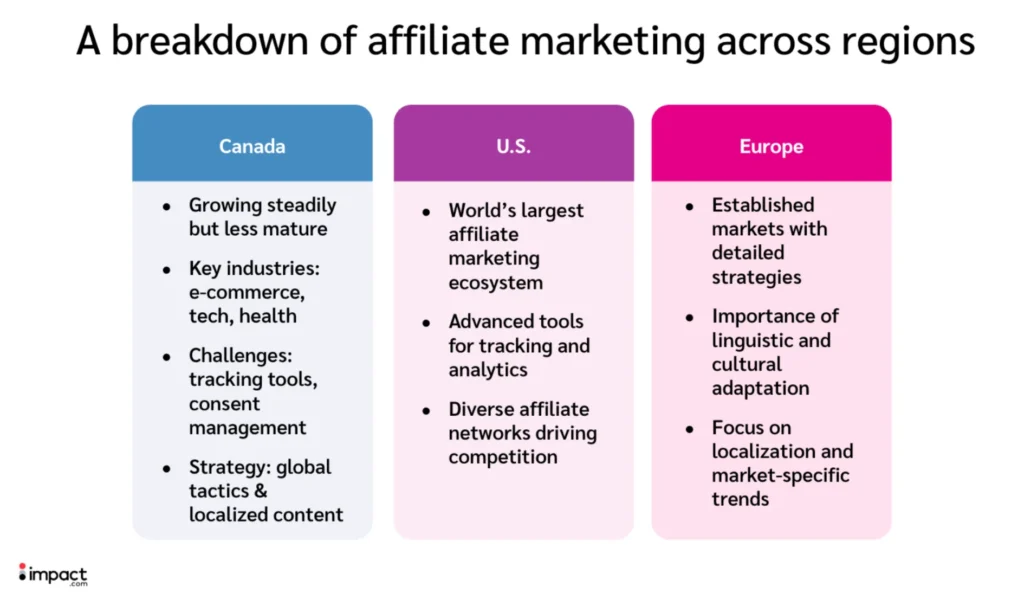
Understanding regional affiliate marketing is key to making a meaningful impact.
Affiliate marketing in Canada: Exploring regional differences
This highlights the need to account for important regional considerations in Canadian affiliate marketing strategies, such as:
- Bilingual content: Quebec requires bilingual content for all marketing materials (digital content and banners, for example), mandating parity in French and English.
- Consumer differences tied to local culture and geography: Cities like Toronto and Montreal thrive on urban-focused affiliate links, while western provinces such as Vancouver appeal more to outdoor and sports-driven audiences.
- Seasonal retail shifts: Unique Canadian holidays like Boxing Day strongly influence buying cycles and affiliate campaigns.
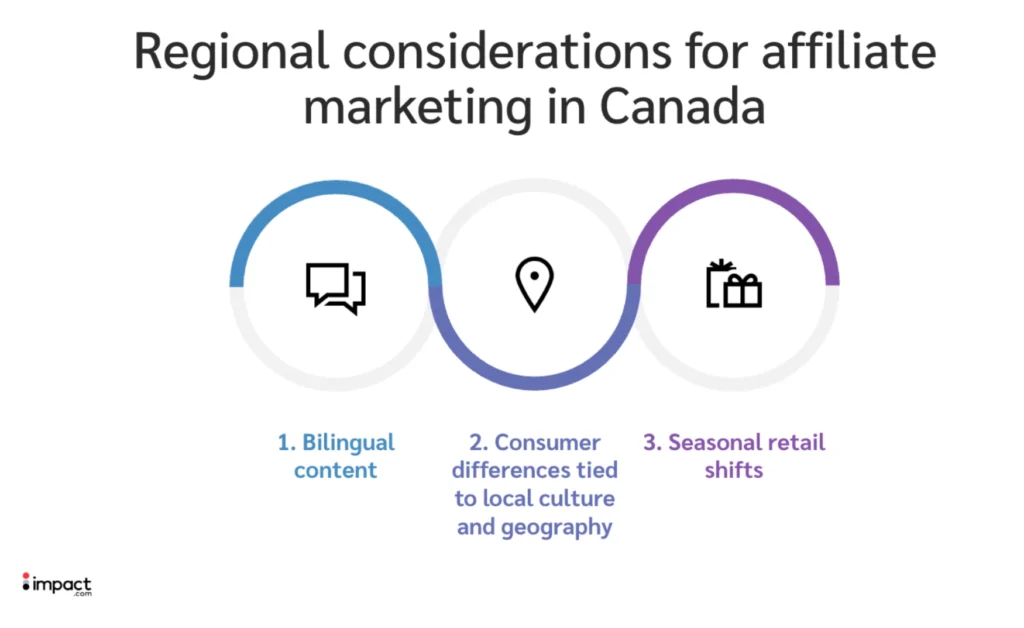
Canadian compliance laws to know before running an affiliate program
To build and maintain trust with Canadian audiences, you’ll need to follow these compliance guidelines:
- Data protection: Get compliance with PIPEDA (Personal Information Protection and Electronic Documents Act) to safeguard customer data.
- Affiliate disclosures: Include clear statements about affiliate relationships in all promotional content.
- Canada’s anti-spam legislation (CASL) compliance: Obtain consent before sending commercial electronic messages, and always include an unsubscribe option.
- Truth in advertising: All claims need to be truthful and substantiated.
- Bilingual advertising: Fulfill marketing obligations in both English and French, especially in Quebec.
- Affiliate terms and agreements: Draft clear terms and conditions for affiliate relationships.
- Tax considerations: Affiliates need to report earnings and adhere to Canadian tax laws.
5 ways affiliate agencies optimize marketing programs for brands
Affiliate program management can be complex, but working with an affiliate agency brings specialized expertise and efficiency to the table.
Here are five key benefits affiliate agencies bring to the table:
- Expertise in affiliate marketing: Agencies have deep insights into the affiliate marketing landscape, ensuring your program benefits from proven strategies and best practices.
- Data-driven recruitment and relationship management: Using data to identify and onboard high-performing affiliates, agencies help you build a strong network for long-term success.
- Strategic partner networks: Agencies have access to established networks, enabling quicker and more effective onboarding of top affiliates.
- Access to advanced tools: Optimize your program with tools for tracking, reporting, and fraud detection, ensuring better performance and transparency.
- Streamlined onboarding: Agencies enhance their strategies by integrating platforms like impact.com, streamlining the affiliate onboarding process at scale. This saves time and resources, allowing you to focus on what matters most.
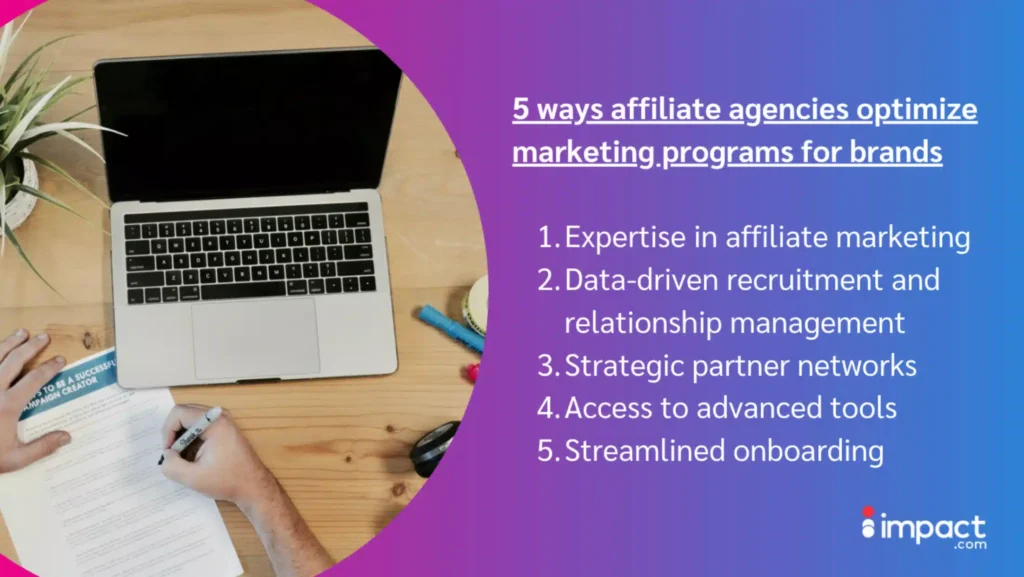
The boutique agency advantage: Customized strategies for enhanced performance
Boutique agencies often provide more personalized approaches compared to larger firms. As Kunal explains, smaller teams, like Seven Square Media, can deliver customized performance marketing solutions that provide relevancy and effectiveness. This approach typically includes:
- Tailored strategies: Every client’s goals are unique, and Seven Square Media creates customized marketing approaches to ensure strategies are both relevant and effective.
- Agile execution: The agency’s size allows for quick decision-making and adaptability, helping them respond swiftly to market trends and client needs.
- Dedicated client attention: Clients receive focused attention from an experienced team, fostering strong relationships and a deep understanding of their business.
Key factors to consider when choosing an agency
Selecting the right affiliate agency is critical to the success of your program. Consider these key factors before you make it official:
- Proven industry experience: Case studies and client testimonials are essential to understanding how an agency has helped others succeed.
- Regional expertise: Ensure the agency can navigate regional challenges and regulatory requirements specific to your market.
- Technology and innovation: The best agencies use advanced tools such as impact.com’s partnership platform to optimize affiliate recruitment, tracking, and reporting processes, giving you a competitive edge.

Working with an experienced affiliate agency can help brands navigate these complexities while maximizing program performance and ROI.
Expanding affiliate marketing programs from the U.S. into Canada
Key challenges for international brands
An affiliate marketing strategy designed for the U.S. needs thoughtful adaptation to succeed in Canada. Key challenges include understanding the unique differences between the two markets.
Vohra emphasizes that treating Canada and the U.S. as the same leads brands to overlook important regional nuances, which are crucial for creating a more tailored and effective approach. Brands should consider:
- Cultural nuances: Most Canadian audiences expect tailored messaging that reflects their regional tastes and values.
- Language requirements: Quebec’s French-first demographic demands bilingual affiliate program materials.
- The regulatory landscape: Strict adherence to CASL and PIPEDA ensures compliance and builds trust.
Strategies for successful market entry
Expanding into the Canadian market can create new opportunities, but success requires careful planning and adaptability. To position your business effectively, consider these key strategies for successful market entry.
Market familiarization
Understanding your audience is the foundation of any successful market entry strategy. Conduct thorough research to learn about Canadian preferences, behaviors, and regional variations.
Consider key aspects such as provincial differences in purchasing power and holiday shopping trends. Time invested in understanding the market’s nuances will steer your strategy toward success.
Localize content
To resonate with Canadian consumers, tailor your messaging to reflect cultural and linguistic nuances.
Partnering with Canadian content creators and affiliates ensures communication aligns with local values. This is especially critical for provinces like Quebec, where French is the primary language.
Vohra highlights that Quebec’s French-first demographic requires unique approaches, emphasizing the importance of creating content in both English and French to resonate effectively. Honoring these distinct preferences helps build trust and relevance throughout your campaigns.
Tailor affiliate programs to Canadian shopping habits
An affiliate program designed with Canadian consumers in mind will drive better engagement.
Align campaigns with region-specific habits and seasonal events, such as Boxing Day, a beloved shopping holiday.
Customize incentives and offers to reflect these local traditions, leveraging affiliates who can connect with the audience authentically.
Target the top-performing social media channels in Canada
Social media dominates consumer interactions in Canada, but priorities vary depending on the platform.
Facebook and Instagram are highly popular, offering benefits for awareness and engagement. YouTube also performs well, particularly for video-driven content.
Meanwhile, TikTok continues to rise, especially among younger demographics. Aligning your social media efforts with these channels ensures your campaigns meet consumers where they already are.

Top affiliate marketing trends in Canada
Affiliate marketing in Canada is constantly changing, creating new opportunities for businesses to reach their audiences.
By following these top trends, brands can boost return on investment (ROI) and build strong, long-term partnerships.
- Influencer partnerships: Influencers are trusted voices within their communities. Partnering with them boosts brand credibility and reach while providing authentic endorsements. Many Canadian brands have seen significant engagement through micro- and macro-influencers.
- Localized content: Authentic storytelling that reflects Canadian culture fosters deeper connections with audiences. Whether it’s content that highlights iconic landmarks, celebrates Canadian traditions, or simply uses colloquial language, developing localized content consistently enhances engagement.
- Mobile optimization: With a high rate of smartphone adoption in Canada, ensuring affiliate content is mobile-friendly is critical. This means optimized website design, quick-loading pages, and mobile-appropriate creatives. Seamless mobile experiences are no longer optional—they’re expected.
- Performance-based models: Measurable outcomes have become a top priority for marketers. Adopting performance-based affiliate programs enables brands to focus on campaigns that deliver clear ROI. This approach ensures a sustainable partnership model where all parties benefit from measurable growth.
Top-performing affiliate partnership types in Canada
Canada’s affiliate ecosystem is rich with opportunities, but understanding where to focus your efforts is essential.
These partnership types have consistently delivered strong results:
- Content affiliates: Local content creators provide tailored engagement with regional audiences, ensuring that brand messaging lands with the right tone. These affiliates are trusted for producing relatable and high-quality material that keeps audiences coming back.
- Coupon and deal sites: Promotions remain a key motivator for Canadian consumers. Coupon and deal sites that offer exclusive discounts play a pivotal role in boosting conversions, especially during major shopping events like Black Friday and Boxing Day.
- Loyalty and cashback affiliates: Brands partnering with loyalty and cashback programs gain access to established customer bases. These programs increase trust, offering consumers a tangible benefit for their purchases, ultimately driving repeat transactions.
- Influencer collaborations: From micro-influencers with hyper-targeted audiences to larger creative personalities, influencer collaborations remain highly effective in Canada. Their ability to build authentic connections drives engagement and builds brand credibility.
- Card-linked offers (CLO) and fintech partners: Innovative approaches like card-linked offers are rising in popularity, offering frictionless cashback rewards to Canadian shoppers. Fintech partnerships further simplify consumer experiences, helping brands stay ahead in this increasingly digital-centric landscape.
Affiliate marketing expert insights: What makes Canada unique
Canada has room to grow in advancing tracking and consent management tools.
Affiliate marketing is steadily growing in Canada, though it differs in scale and maturity compared to markets like the US and Europe.
Kunal highlights that Canada poses unique challenges due to regulatory requirements and distinct regional consumer behaviors, which U.S. brands must carefully consider. He adds that loyalty and cashback programs in Canada are highly competitive, often rivaling or even surpassing those in other regions.
However, Canada lags behind in tracking and consent management tools, which Kunal notes could hinder the overall effectiveness of affiliate programs. For U.S. brands looking to expand into the Canadian market, understanding these nuances and planning accordingly is essential for success.
Understanding Canada’s unique market dynamics
Canada’s affiliate marketing landscape differs significantly from the U.S. in several key ways. The market is steadily growing but remains less mature than American or European counterparts, particularly in tracking and consent management capabilities.
As Kunal highlights, “Canada lags behind in tracking and consent management tools, which could hinder the overall effectiveness of affiliate programs.”
Canadian consumers have strong loyalties to domestic brands like Canadian Tire, Loblaws, Indigo, and Aeroplan—household names that remain largely unknown outside Canada. Kunal says these “leading Canadian brands are deeply woven into the fabric of daily life in Canada, even though they remain lesser-known outside the country.”
Additionally, the growing “Buy Canadian” sentiment, influenced by current political and economic factors, means brands must demonstrate a genuine understanding of Canadian values and preferences. Brands can secure a competitive advantage by partnering with someone who deeply understands Canadian values, perspectives, and priorities.
For U.S. brands, this means working with partners who truly understand Canadian consumer behavior and can navigate the cultural nuances that drive purchasing decisions across different provinces and demographics.
Quebec’s French-first demographic requires a tailored affiliate strategy
Quebec, home to more than 9 million people, is a French-first province that stands out as a unique market within Canada.
According to Kunal, “Many e-commerce brands entering Canada tend to focus on English-speaking regions, but if you’re targeting Quebec, localized content in both English and French is essential for meaningful engagement.”
National brands operating across the country often ensure their products or services are bilingual—not just for compliance, but to connect with Quebec’s audience. Kunal also notes, “Quebec-based brands often run affiliate programs targeting the rest of Canada, and the same applies for brands outside Quebec looking to make an impact in the province.”
For U.S. brands expanding into Canada, this means affiliate programs, banners, text links, and other creatives must include French localization. Achieving success in Quebec requires more than just translating content. As Vohra explains, it demands a deep understanding of the cultural and linguistic nuances that genuinely resonate with French Canadians.
Measuring performance and integrating technology to optimize affiliate marketing success
How the right platform can streamline the full partner life cycle
Looking to simplify affiliate recruitment and management? These are the tools to look for when sourcing a platform:
- Connect with the right partners: Use a marketplace to connect with affiliates that align perfectly with your brand objectives and target audiences.
- Comprehensive partner management: Simplify recruitment and streamline relationship management.
- Customizable commission structures: Create tailored commission models to incentivize affiliates based on performance and strategic goals.
- Automate workflows: Reduce administrative burdens with automated payments, contract management, and reporting.
- Granular targeting features: Sort affiliates by traffic location, verticals, and engagement size for highly targeted campaigns.
- Real-time reporting: Access up-to-date analytics to quickly identify trends and optimize affiliate performance.
- Fraud detection tools: Protect your program with advanced tools to detect and mitigate fraudulent activities, ensuring program integrity.
Best practices for integrating technology into affiliate strategies
Optimizing your affiliate marketing strategy with technology is key, especially when scaling from the U.S. to Canada. Here are three effective tactics to boost recruitment, engagement, and performance:
- Automated onboarding: Streamline the recruitment process by using platforms like impact.com to save time and enhance affiliate engagement.
- Data-driven campaigns: Use analytics to gain insights, refine your targeting, and evaluate affiliate performance for better results.
- Customizable commission structures: Motivate top-performing affiliates with scalable, tailored incentives to drive even greater success.
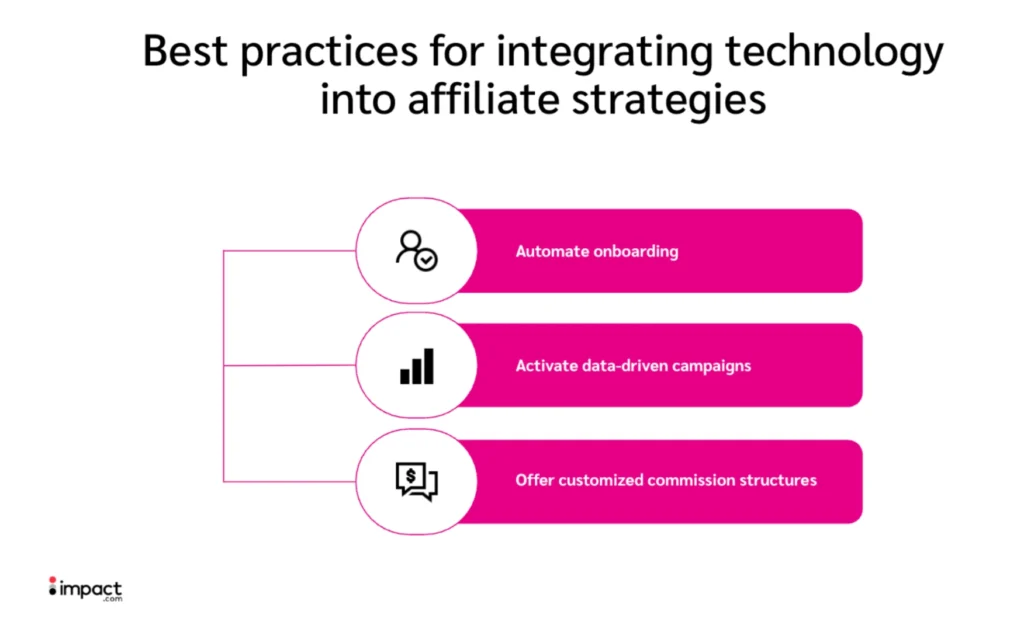
Performance-driven affiliate strategy: Metrics brands should prioritize
As brands look to expand their U.S. affiliate programs into Canada, understanding key performance metrics is essential for success.
Here are some critical terms to track and evaluate:
- Conversion rate: The percentage of referred visitors who complete a desired action, indicating the effectiveness of affiliate promotions.
- Average order value (AOV): Monitoring AOV helps assess the quality of traffic and the impact of affiliate promotions on sales volume.
- Customer acquisition cost (CAC): Calculating CAC ensures that the cost of acquiring new customers through affiliates aligns with overall marketing budgets and goals.
- RO): Evaluating ROI determines the profitability of affiliate partnerships, guiding future investment decisions.
- Click-through rates: Metrics such as click-through rates and time spent on site provide insights into how effectively affiliates are engaging potential customers.
- Churn rate: Evaluate the retention rate of customers acquired through affiliates to determine long-term value.
Tips on affiliate link management and affiliate relationship-building
Building a successful affiliate program requires a strategic approach to maximize brand awareness and revenue. Here are some key tips to optimize affiliate link management and build long-term partnerships:
- Diversify your affiliate portfolio: Avoid relying solely on content creators or influencers for affiliate link management. While they effectively drive brand awareness and use affiliate links, your program should also include traditional affiliates for optimal performance.
- Set realistic key performance indicators (KPIs): Understand that content creators often operate at the top of the funnel. They may not deliver high revenue like traditional affiliates, so set goals that align with their role in the customer journey.
- Focus on relationship management: Personalized communication between agencies, brands, and creators is key to minimizing roadblocks and ensuring strong brand alignment. Building solid relationships fosters trust and better results in affiliate link management.
- Educate yourself on market dynamics: If you’re entering the Canadian affiliate market, work with partners experienced in managing both content creators and traditional affiliates to maximize link performance and overall results.
- Balance content and revenue goals: For revenue growth, combine content creators with traditional affiliates to create a well-rounded strategy that balances brand awareness and conversions.
Success stories: Leveraging Seven Square Media and impact.com
Decathlon enters the Canadian market and achieves 533 percent revenue growth YoY
Program overview
Decathlon, one of the world’s largest sports retailers, wanted to expand its affiliate program beyond North America and into the Canadian market. To make this happen, the team needed to:
- Strengthen their recruitment strategy
- Implement advanced partnership technology for scalable growth
- Work with an agency that understood the Canadian market
That’s where Seven Square Media stepped in to run the program, leveraging impact.com’s technology to make it happen.
How Decathlon achieved over 500 percent revenue growth:
- Expanding the partner network: Using impact.com’s Marketplace, the team diversified its partnerships to reach new audiences.
- Ensured policy compliance: Next, the team leveraged impact.com’s Paid Search Monitoring feature to detect and address any partner policy violations.
- Optimized performance: The team leveraged impact.com’s advanced reporting tools to analyze consumer behavior, measure outcomes, and drive continuous improvement, leading to optimized performance.
Results
- 20 percent boost in efficiency
- 533 percent year-over-year affiliate growth
- 182 percent increase in conversion rates over three years
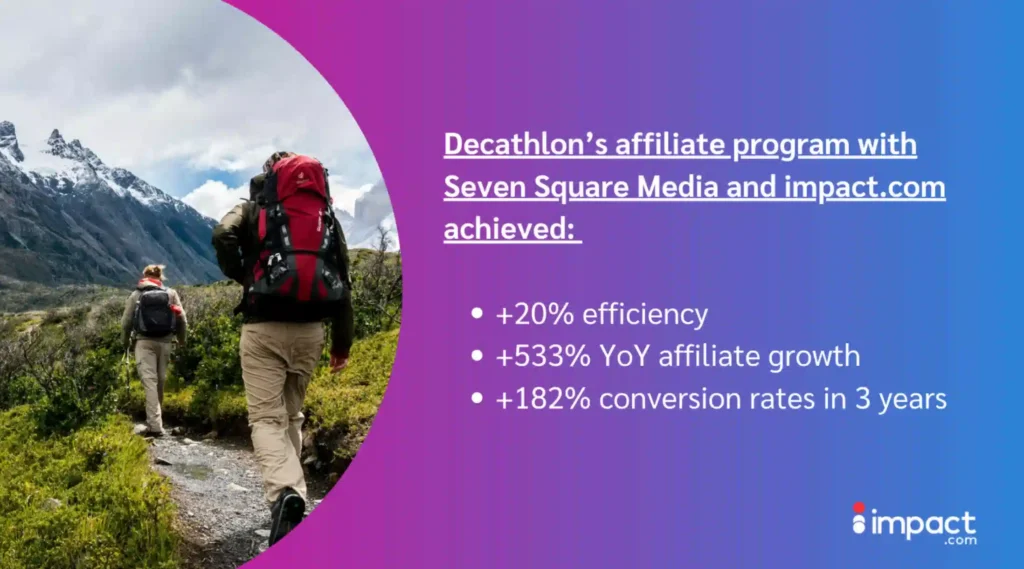
Decathlon boosted affiliate program efficiency by 20 percent with impact.com’s technology and Seven Square Media’s expertise.
A smart strategy combined with the right tools and partnerships helped Decathlon achieve incredible success in the Canadian market. Read the full case study here.
DeSerres grows affiliate program revenue up to 7 percent
Program overview
- Launch: DeSerres, a leading Canadian retailer specializing in art supplies and crafting tools, launched its affiliate program on impact.com in August 2024.
- Strategic management: Managed by Seven Square Media, with prior experience running affiliate programs for Decathlon Canada and America, impact.com was selected as the ideal platform for DeSerres.
Key impact.com features used for this program
- Intuitive interface: impact.com’s offered DeSerres to streamline everyday tasks such as report access and affiliate recruitment, saving time and improving efficiency.
- Marketplace tool: The Marketplace enabled simplified partner discovery and selection by filtering based on audience, demographics, location, and category, leading to strategic, high-value partnerships.
- Paid Search Monitoring: This feature ensured affiliates adhered to advertising policies, allowing immediate action on any violations and maintaining program integrity.
For this campaign, Vohra highlighted impact.com’s Paid Search Monitoring feature as his favorite. He adds that the tool provides peace of mind by ensuring that all partners comply with advertising policies. It helps quickly identify and resolve issues, maintaining brand compliance and building trust across affiliates.
Results
- Affiliate sales growth: From August to December, affiliate sales consistently contributed 5–7 percent of monthly e-commerce revenue.
- DeSerres saw steady affiliate program growth and efficiency improvements, with impact.com playing a central role in driving e-commerce sales and fostering strong, compliant partnerships.
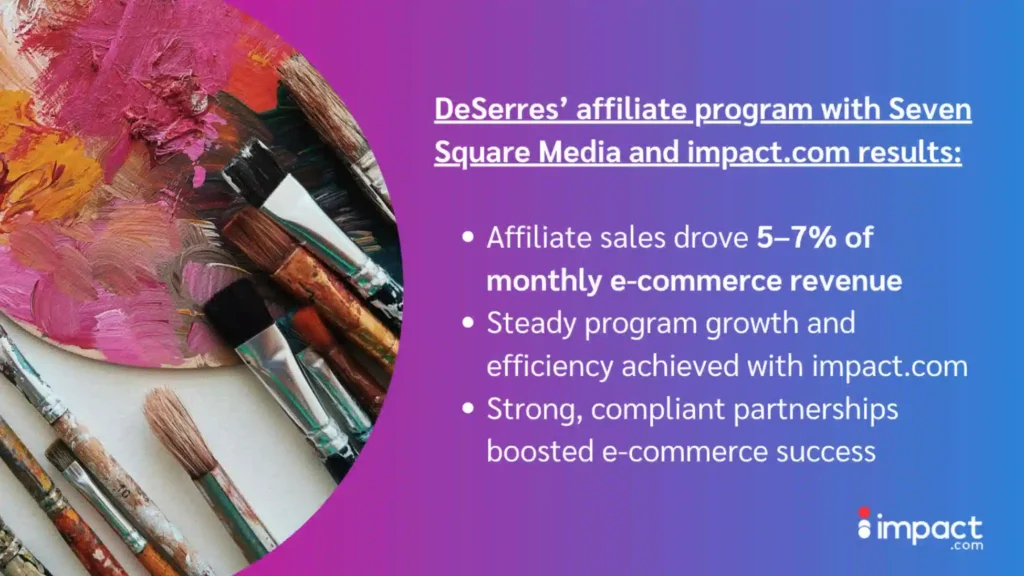
Arts and crafts retailer DeSerres revamped its affiliate program, achieving consistent growth through the support of impact.com and Seven Square Media.
How to build a thriving affiliate program in Canada
Start with recruiting the right partners
Successfully recruiting top-tier affiliate partners in Canada requires a strategic approach. Here’s how to get started:
- Targeted outreach: Engage with influencers and content creators who resonate with Canadian cultural values and have a strong following in specific regions.
- Localized content collaboration: Work with affiliates to develop content that reflects Canada’s diversity, ensuring relevance to both English and French-speaking audiences.
- Competitive commission structures: Offer attractive and competitive commission rates to motivate affiliates, considering industry benchmarks and regional market standards.

Tips for building a successful affiliate program
Building genuine connections with your audience is key to achieving real results in marketing. Micro-influencers are a great way to do this. As Kunal explains, they thrive in engaged communities and deliver strong conversion rates through their authentic content.
To create great campaigns, brands should focus on strategies that emphasize authenticity, relevance, and collaboration.
Here are some key tips to keep in mind:
- Leverage micro-influencers and niche creators: Partner with micro-influencers who have highly engaged audiences in specific communities. Their authentic content often leads to stronger conversion rates.
- Foster consistent communication: Maintain open collaboration between the brand, agency, and affiliates. Clear goals and streamlined planning ensure effective campaign management.
- Implement a test-and-scale framework: Experiment with various types of content and affiliate partnerships. Use data to identify what resonates most and scale it for maximum efficiency.
- Create authentic, audience-centric content: Craft content that aligns with your audience’s values, interests, and cultural context to boost engagement and drive conversions.
- Send the right message: Send marketing messages that speak directly to specific groups. When your content feels relevant, people are more likely to engage and take action.
- Stay on brand: Maintain consistency across all marketing channels to create a unified brand message, building trust and driving desired actions.
- Consider regional nuances: Outlining factors such as holidays, bilingual content, and local purchasing habits to make campaigns more relatable and effective.
By focusing on these strategies, brands can develop campaigns that resonate with their audiences, driving both engagement and measurable results.
Make your move into the Canadian market with confidence
Ready to expand into the Canadian market? Success requires local expertise, the right technology platform, and a deep understanding of regional nuances. Consider partnering with agencies experienced in Canadian markets and leverage proven affiliate marketing platforms to build your program strategically.
FAQs
Effective tracking tools are essential for Canadian affiliate programs. Look for platforms that offer robust tracking and attribution capabilities, real-time analytics, marketplace features for partner discovery, and comprehensive reporting. Key features should include accurate performance tracking, partner management tools, and data-driven insights for optimization. Additionally, strong communication channels between all stakeholders—agencies, brands, and network representatives—are crucial for program success.
Canadian household brands like Canadian Tire, Loblaws, Indigo, and Aeroplan play a unique role in shaping affiliate strategies, as their distinct presence resonates deeply with Canadian consumers. These brands often require affiliate programs to reflect the specific preferences of the Canadian market, which differs from the U.S. or Europe. Successful affiliates in Canada typically fall into categories like content creators, loyalty programs, coupon and deal sites, as well as emerging partnerships in fintech and card-linked offers (CLO). Collaborating with these types of affiliates can help brands tap into the trust and loyalty established by these household names. For international brands entering Canada, aligning with local affiliate trends and leveraging content-driven partnerships is key to breaking into this competitive but lucrative market.
The “buy Canadian” sentiment plays a significant role in influencing consumer behavior, particularly in the current political and economic landscape. For affiliate marketing, this means brands need to align their messaging and partnerships with Canadian values, emphasizing local relevance and understanding key cultural touchpoints like Boxing Day or Canadian Thanksgiving. Partnering with affiliates who have deep knowledge of the Canadian market ensures campaigns resonate with audiences and build trust. International brands looking to enter Canada should prioritize working with agencies or affiliates that understand regional nuances, including preferences for local products and services. By tailoring your approach to reflect the “buy Canadian” sentiment, brands can strengthen consumer connections and drive higher engagement and conversions.





